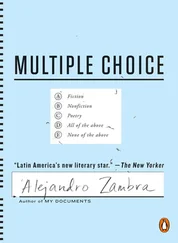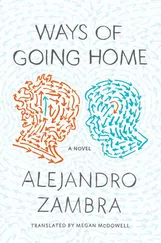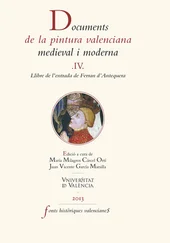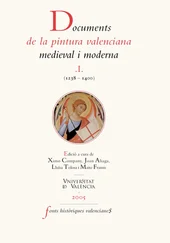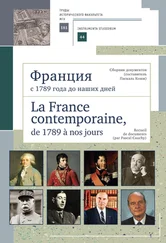Nor will it work for Feliciano to be a gym teacher. He imagines him unemployed instead, humiliated and jobless at the start of the eighties, or, later, surviving in the work programs of the dictatorship, endlessly sweeping the same bit of sidewalk, or turned into a snitch who informs on suspicious activity in the neighborhood, or maybe even knifing someone to the ground. Or maybe as a cop, one who comes home late and shouts for his food, and who has no qualms about threatening his daughter at night with the same billy club he used to beat back protesters at noon.
He has some doubts at this point, but they’re nothing serious. Nothing is that serious, he thinks: it’s just a ten-page story, fifteen pages tops, he doesn’t have to waste time on the backstory. Two or three resonant phrases, a few well-placed adjectives will fix any problems. He parks, takes the gas cans out of the trunk, and then, while he fills the heater’s tank, he imagines Joana splashing kerosene all over the house, with her father inside — too sensationalist, he thinks, he prefers a gun, maybe because he remembers that there was a gun in Yasna’s house, that when she said she was going to kill her father she mentioned the gun in the house.
There was a gun, of course there was, but it was only an air rifle, which had lain idle for years in the closet. It was a testament to the time when the man used to go to the country with his friends to hunt partridge and rabbit. Only once, one spring Sunday, coming back from church when she was seven years old, did Yasna see her father fire it. He was in the yard, downing a beer and taking aim with a steady hand at the kites in the sky over the park. He hit the bull’s-eye four times: the owners couldn’t understand what was happening. Yasna thought about those parents and children from other neighborhoods watching their kites founder and crash, so disconcerted, but she didn’t say anything. Later she asked him if you could kill someone with that rifle, and he answered that no, it was good only for hunting. “Though if you got the guy in the head from close up,” amended her father after a while, “you’d fuck him up pretty good.”
After the party, the writer — who at that time didn’t even dream of becoming a writer, though he dreamed about many other things, almost all of them better than being a writer — was terribly scared and didn’t make any effort to see Yasna again. He avoided the street that led to her house, all the streets that led to her house, and he didn’t go to church, either, since he knew that she went to church, and in any case this didn’t take a lot of effort because by then he had stopped believing in God.
Six years passed before their paths crossed again. He saw her by chance, in the city center. Yasna’s hair was straighter and longer; she was wearing the two-piece suit they’d given her at work. He was wearing a plaid flannel shirt and combat boots, his hair disheveled, as if he wanted to exemplify the fashion of the times — or the part of fashion that corresponded to him, a literature student. By then he could be called a writer, he had written some stories. Whether they were good or bad was not important — a writer is someone who writes, a little or a lot, but who writes, just as a murderer is someone who kills, whether they’ve claimed one person or many. And it isn’t fair to say that she was nothing, then, that she was no one, because she was a cashier at a bank. She didn’t like the work but she also didn’t think — nor does she think now — that there existed any job that she would like.
While they drank Nescafé at a diner they talked about the beating, and she tried to explain what had happened, but she said she wasn’t very clear on that herself. Then she talked about her childhood, especially about her mother’s death in a car crash, she’d barely gotten to know her, and she talked to him about the assistant, which was how her father had first introduced the man to her while they were varnishing some wicker chairs in the yard, although some days later he told her, as if it wasn’t important, that actually the assistant was the son of a friend who had died, that he didn’t have anywhere to go and so he’d be living with them for a while. The assistant was twenty-four years old then, he came home late at night, he slept most of the morning, he didn’t work or study, but sometimes he babysat the little girl, mostly on Tuesdays, when Yasna’s father got home at midnight after practicing with his basketball team, and Saturdays, when her father had games and then went out with his teammates to drink a few beers. The writer didn’t understand why she was telling him all this, as if he didn’t know (and maybe he didn’t, although, by that point, since he was already a writer, he should have known) that this was the way people get to know each other, by telling each other things that aren’t relevant. By letting their words fly happily, irresponsibly, until they reach dangerous territories.
Although the conversation wasn’t over, he asked her if she had a phone, if there was some way they could see each other again, because right now he had a party to go to. She shrugged, and maybe she was waiting for him to invite her to that party, although in any case she couldn’t go, but he didn’t invite her, and then she didn’t want to give him her number anymore. She also forbade him from showing up at her house, even though the assistant no longer lived there.
“Then how will we see each other?” he asked again, and she, again, shrugged her shoulders.
But she’d mentioned the name of the bank where she worked, which had only three branches, so he was able to track her down a few weeks later, and they began a routine of lunches, almost always at a fried-chicken place on Calle Bandera, other times at a joint on Teatinos, and also, when one of them had more money, at Naturista. He went on hoping for something more to happen, but she was elusive, she told him about a boyfriend who was so generous and understanding he seemed clearly invented. Sometimes, for long stretches, he watched her talk but didn’t listen to her. He looked most of all at her mouth, her teeth, perfect except for the stains from cigarette smoke on the front ones. He would do this until she raised or lowered her voice, or maybe let slip some unexpected bit of information, as she did one time with a sentence that, although he hadn’t the slightest idea what she’d been talking about, brought him back to the present, though she didn’t say it in the tone of a confession: on the contrary, she said it as if it were a joke, as if it were possible for a sentence like that one to be a joke. “I wasn’t happy in my childhood” was what she said, and he didn’t understand what he should have understood, what anyone today would understand, but hearing her say it still shook him, or at least it woke him up.
Did she really use that word, so formal, so literary: childhood ? Maybe she said “When I was a kid” or “When I was little.” Whatever she’d said, one would have had to tell the entire story, years ago, cultivating a sense of mystery, taking care with one’s dramatic effects, building up gradual, shocking emotion. Good writers and also bad ones knew how to do this, it didn’t seem immoral to them, they even enjoyed it, to the extent that depicting a story always brings a certain kind of pleasure. But what would that mystery be good for now, what kind of pleasure could be gained when the sentence that says it all has already been let loose? Because there are some phrases that have won their freedom: phrases we have learned how to hear, to read, to write. Fifteen, thirty years back, good writers, and bad ones too, would have trusted in a sentence like that to awaken a mystery that they would reveal only at the end, with a scene of the father asleep and the assistant in the bedroom touching the nipples of a ten-year-old girl, who is surprised but, as if it were a game of Monkey See, Monkey Do, puts her own hand under the assistant’s shirt and, with utter innocence, touches his nipple back.
Читать дальше

